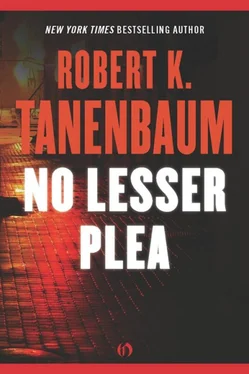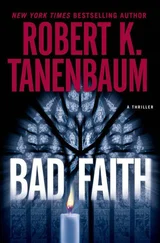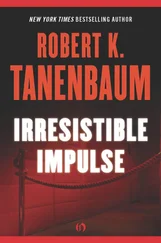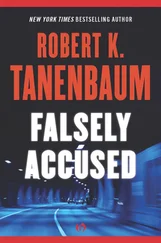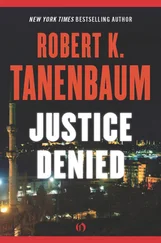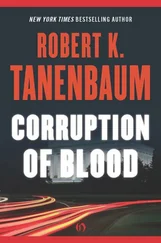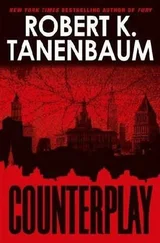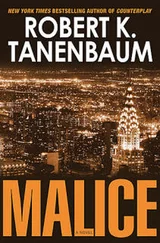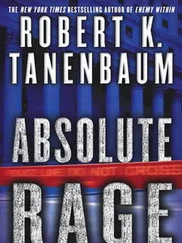Robert Tanenbaum - No Lesser Plea
Здесь есть возможность читать онлайн «Robert Tanenbaum - No Lesser Plea» весь текст электронной книги совершенно бесплатно (целиком полную версию без сокращений). В некоторых случаях можно слушать аудио, скачать через торрент в формате fb2 и присутствует краткое содержание. Год выпуска: 2011, ISBN: 2011, Издательство: Open Road Integrated Media, Жанр: Криминальный детектив, на английском языке. Описание произведения, (предисловие) а так же отзывы посетителей доступны на портале библиотеки ЛибКат.
- Название:No Lesser Plea
- Автор:
- Издательство:Open Road Integrated Media
- Жанр:
- Год:2011
- ISBN:978-1-4532-0994-3
- Рейтинг книги:4 / 5. Голосов: 1
-
Избранное:Добавить в избранное
- Отзывы:
-
Ваша оценка:
- 80
- 1
- 2
- 3
- 4
- 5
No Lesser Plea: краткое содержание, описание и аннотация
Предлагаем к чтению аннотацию, описание, краткое содержание или предисловие (зависит от того, что написал сам автор книги «No Lesser Plea»). Если вы не нашли необходимую информацию о книге — напишите в комментариях, мы постараемся отыскать её.
No Lesser Plea — читать онлайн бесплатно полную книгу (весь текст) целиком
Ниже представлен текст книги, разбитый по страницам. Система сохранения места последней прочитанной страницы, позволяет с удобством читать онлайн бесплатно книгу «No Lesser Plea», без необходимости каждый раз заново искать на чём Вы остановились. Поставьте закладку, и сможете в любой момент перейти на страницу, на которой закончили чтение.
Интервал:
Закладка:
Karp traded in his crutches for a cane and by Christmas he was walking unaided. He began once again to walk to and from the office when the streets weren’t slick. Toward the end of the winter he grew restless. I’m waiting, he thought. Waiting for what? For spring. For the girl to get better. Waiting for him, for Louis, to make his move.
In March, nearly four years from the day he had murdered the Marchiones, Mandeville Louis reappeared in court. He had spent the fall and winter back in Matteawan, worrying and making plans. He kept telling himself time was on his side. Maybe the witness would die. Maybe Karp would die, or Elvis. He covered sheets of paper with carefully drawn plans, boxes and arrows, showing what would happen if this one did this and the other one did that. He stayed up late making one backup plan after another. Somehow they never seemed to make much sense in the morning and he would take his night’s work and tear it to shreds.
He couldn’t make contact with the perfect Louis anymore. That was what hurt the most. He had to pretend so much, to be cheerful, and not act out, not give vent to his almost continuous rage. Dr. Dope didn’t like acting out. Louis’s life had, of course, been one long pretense, but then he had been the master, that was the point.
He couldn’t get Karp out of his mind. Karp knew. That was the tumor eating his brain. He had tried to destroy Karp and failed. And Elvis was ratting him out. That hurt too, after all he had done for that little punk. And he couldn’t get to him. He took his yellow legal pad and wrote, “KARP KNOWS” and “ELVIS RATS” in big block letters. He drew lines connecting different letters together, trying to make sense out of it, trying for some combination that would bring back the old Louis.
Around three one morning, eyes burning, hand aching from gripping the pencil, he knew he had found it. He wrote furiously, page after page. From time to time he laughed out loud. The next day, early, he called Leonard Sussman and told him to set a hearing date.
When Karp saw Judge Yergin on the bench, he thought he had died and gone to heaven. He had been expecting Stein, and he didn’t think even Daniel Webster could have convinced the old Swerve-with his elaborate political connections to the psychiatric community- that one of its distinguished members was both a jerk and a crook. Yergin looked irritated and bored. He must have been dragged in to preside at the last minute. Karp felt he was on a roll.
The players were in their familiar places: Louis looking docile, dull-skinned, and tired, flabby from four years of hospital food; Sussman, unchanging, immaculate, sitting rather farther away from his client than was usual. But this time there were more supporting characters. Dr. Edmund Stone, for one, had been dragged from his research and pinned to the stand, like one of his preparations, by Karp’s questions.
“Doctor Stone,” Karp was saying, “I don’t understand. Are you able to tell this court today if Mandeville Louis is competent to stand trial?”
“Yes, I am,” Stone answered. In fact, he barely remembered Louis. He had just done whatever Werner told him to do, and had signed off on whatever Werner told him to sign. Werner left him alone and didn’t ask too many questions about what experimental drugs Stone gave to indigent patients. It was a fair deal.
“Good. I ask you again, Doctor. In your medical opinion, is the defendant, Mandeville Louis, competent and ready to stand trial?”
Stone essayed a superior smile. “That would depend.”
“Doctor, you just told me you could answer the question. Do so!”
“The issue in a Ganser syndrome case, you must understand, is not the definition of ‘competence’ but of ‘ready.’ ”
“Ready? That means right now, prepared, able to understand the charges made against him and aid in the preparation of his defense. So yes or no-which is it? Doctor.” Karp put as much heat and venom into this last thrust as he thought he could get away with- without being accused of harassing the witness.
Stone was taken aback. He was used to more deference.
“No, no. You are defining competency. I am well aware of what competency means. Mister Louis is a Ganser sufferer. That means the issue is not whether he is competent, but when he is competent. Mister Louis is competent to stand trial, except when he is actually standing trial.”
Yergin coughed. “Would you repeat that?”
“Certainly,” sad Stone with more confidence. “Mister Louis is a competent adult able to do anything that competent adults do, including understanding criminal charges and assisting a lawyer in his own defense. But once such a charge is made against Mister Louis, and he finds himself in a court of law about to be prosecuted for a crime, Mister Louis loses all semblance of competency.”
“And how do you know that this loss of competence will occur when Mister Louis is tried?”
“Because he has Ganser syndrome.”
“And how do you know that?”
“Because of the manifestations of incompetence at trial, of course. It’s diagnostic. The principal effect of Ganser syndrome is that the sufferer becomes incompetent to stand trial, but only once the trial begins. Or, of course, if he were remanded for trial, it would be the same. The symptoms could evince themselves at any time. Naturally, we are still doing research on the etiology of this disease.”
“Naturally,” said Yergin dryly. He turned to Sussman.
“Look, Mister Sussman, answer me this. Is your client, in your opinion, presently competent to stand trial?”
“Your Honor,” Sussman said, “it appears that my client is presently aware of this proceeding. My impression is borne out by the psychiatrists’ reports, which state that he is presently competent. Our concern is for what will happen once a trial actually begins.”
“Then maybe we should go to trial and see what happens,” said Yergin. “I mean, if the man is competent right now, that’s all I need to hear. How does that sit with you, Mister Karp?”
It sat very badly. Yergin obviously wanted to move this case, and he was playing into Louis’s hands. Without a formal finding that Louis was malingering and not suffering from a purported Ganser syndrome, he could stage another bizarre episode at trial and go through another round in his game.
“Your Honor, I think it is essential that the court make a finding as to whether the defendant does indeed suffer from so-called Ganser syndrome. This is the first time the conclusions of the Bellevue Hospital psychiatric staff have been challenged in this case. I think the court will agree that if it can be shown that Mister Louis is not in fact a sufferer from a mental disease that makes him incompetent to stand trial, the disposition of this case in the future will be quite different from what it would be if we simply remanded him at this time.”
Yergin got the point. “Very well, Mister Karp. You may resume questioning.”
Karp turned once more to Stone. “Doctor, one last question. As the defendant sits here now, is it your opinion that he is competent?”
Stone said “Yes.” Karp sat down. The judge offered Stone to Sussman, who declined to cross-examine. The court broke for lunch, and at two Karp called Dr. Milton C. Werner to the stand.
Werner liked testifying in court. His expression was benign, his carriage confident as Karp went through the preliminaries of identification and qualifications, and established that Werner agreed with Stone completely about Louis suffering from Ganser syndrome. Then Karp began to dig the pit.
“Doctor Werner, is there anything that might possibly indicate that the defendant does not suffer from Ganser syndrome?”
Читать дальшеИнтервал:
Закладка:
Похожие книги на «No Lesser Plea»
Представляем Вашему вниманию похожие книги на «No Lesser Plea» списком для выбора. Мы отобрали схожую по названию и смыслу литературу в надежде предоставить читателям больше вариантов отыскать новые, интересные, ещё непрочитанные произведения.
Обсуждение, отзывы о книге «No Lesser Plea» и просто собственные мнения читателей. Оставьте ваши комментарии, напишите, что Вы думаете о произведении, его смысле или главных героях. Укажите что конкретно понравилось, а что нет, и почему Вы так считаете.
